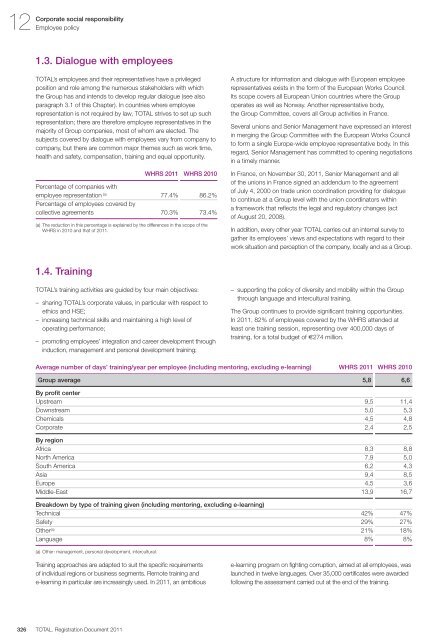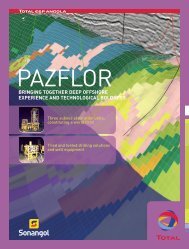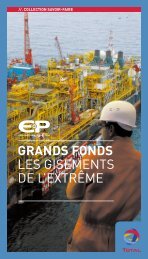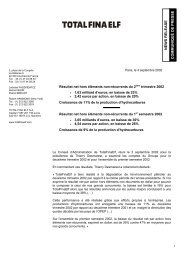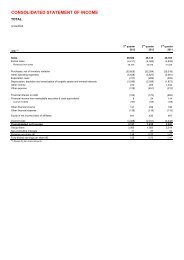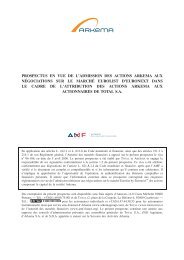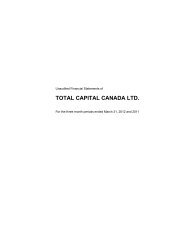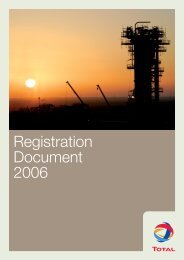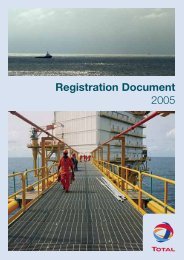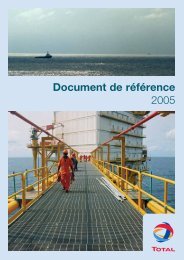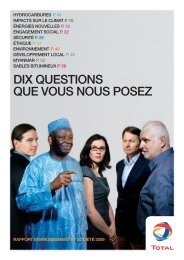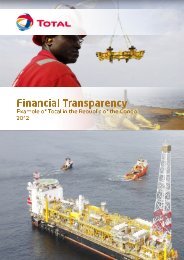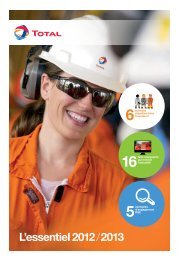Registration document 2011 - tota - Total.com
Registration document 2011 - tota - Total.com
Registration document 2011 - tota - Total.com
Create successful ePaper yourself
Turn your PDF publications into a flip-book with our unique Google optimized e-Paper software.
12<br />
326<br />
Corporate social responsibility<br />
Employee policy<br />
1.3. Dialogue with employees<br />
TOTAL’s employees and their representatives have a privileged<br />
position and role among the numerous stakeholders with which<br />
the Group has and intends to develop regular dialogue (see also<br />
paragraph 3.1 of this Chapter). In countries where employee<br />
representation is not required by law, TOTAL strives to set up such<br />
representation; there are therefore employee representatives in the<br />
majority of Group <strong>com</strong>panies, most of whom are elected. The<br />
subjects covered by dialogue with employees vary from <strong>com</strong>pany to<br />
<strong>com</strong>pany, but there are <strong>com</strong>mon major themes such as work time,<br />
health and safety, <strong>com</strong>pensation, training and equal opportunity.<br />
1.4. Training<br />
TOTAL’s training activities are guided by four main objectives:<br />
– sharing TOTAL’s corporate values, in particular with respect to<br />
ethics and HSE;<br />
– increasing technical skills and maintaining a high level of<br />
operating performance;<br />
– promoting employees’ integration and career development through<br />
induction, management and personal development training;<br />
Average number of days’ training/year per employee (including mentoring, excluding e-learning) WHRS <strong>2011</strong> WHRS 2010<br />
Group average 5,8 6,6<br />
By profit center<br />
Upstream 9,5 11,4<br />
Downstream 5,0 5,3<br />
Chemicals 4,5 4,8<br />
Corporate 2,4 2,5<br />
By region<br />
Africa 8,3 8,8<br />
North America 7,9 5,0<br />
South America 6,2 4,3<br />
Asia 9,4 8,5<br />
Europe 4,5 3,6<br />
Middle-East 13,9 16,7<br />
Breakdown by type of training given (including mentoring, excluding e-learning)<br />
Technical 42% 47%<br />
Safety 29% 27%<br />
Other (a) 21% 18%<br />
Language 8% 8%<br />
(a) Other: management, personal development, intercultural.<br />
Training approaches are adapted to suit the specific requirements<br />
of individual regions or business segments. Remote training and<br />
e-learning in particular are increasingly used. In <strong>2011</strong>, an ambitious<br />
TOTAL. <strong>Registration</strong> Document <strong>2011</strong><br />
WHRS <strong>2011</strong> WHRS 2010<br />
Percentage of <strong>com</strong>panies with<br />
employee representation (a) 77.4% 86.2%<br />
Percentage of employees covered by<br />
collective agreements 70.3% 73.4%<br />
(a) The reduction in this percentage is explained by the differences in the scope of the<br />
WHRS in 2010 and that of <strong>2011</strong>.<br />
A structure for information and dialogue with European employee<br />
representatives exists in the form of the European Works Council.<br />
Its scope covers all European Union countries where the Group<br />
operates as well as Norway. Another representative body,<br />
the Group Committee, covers all Group activities in France.<br />
Several unions and Senior Management have expressed an interest<br />
in merging the Group Committee with the European Works Council<br />
to form a single Europe-wide employee representative body. In this<br />
regard, Senior Management has <strong>com</strong>mitted to opening negotiations<br />
in a timely manner.<br />
In France, on November 30, <strong>2011</strong>, Senior Management and all<br />
of the unions in France signed an addendum to the agreement<br />
of July 4, 2000 on trade union coordination providing for dialogue<br />
to continue at a Group level with the union coordinators within<br />
a framework that reflects the legal and regulatory changes (act<br />
of August 20, 2008).<br />
In addition, every other year TOTAL carries out an internal survey to<br />
gather its employees’ views and expectations with regard to their<br />
work situation and perception of the <strong>com</strong>pany, locally and as a Group.<br />
– supporting the policy of diversity and mobility within the Group<br />
through language and intercultural training.<br />
The Group continues to provide significant training opportunities.<br />
In <strong>2011</strong>, 82% of employees covered by the WHRS attended at<br />
least one training session, representing over 400,000 days of<br />
training, for a <strong>tota</strong>l budget of €274 million.<br />
e-learning program on fighting corruption, aimed at all employees, was<br />
launched in twelve languages. Over 35,000 certificates were awarded<br />
following the assessment carried out at the end of the training.


